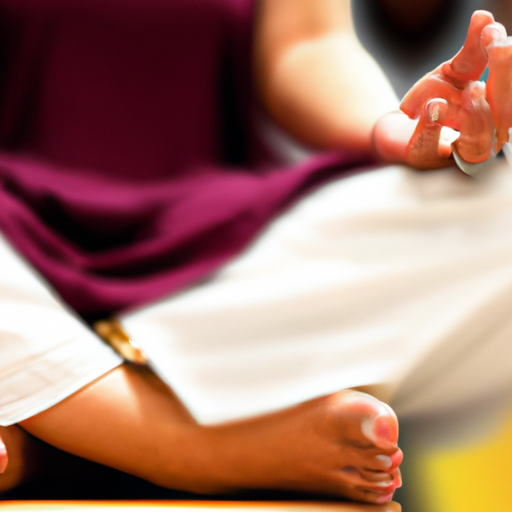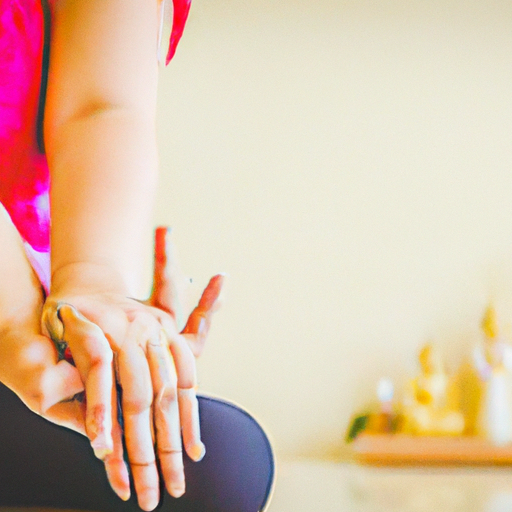
Have you ever wondered if you have the potential to become a Reiki healer? Well, the great news is that anyone can learn Reiki healing! Reiki is a Japanese healing technique that uses energy to balance the body and promote healing. It is not limited to a certain group of people or a specific skill set. Whether you are a complete beginner or have previous experience in energy healing, Reiki can be learned by anyone who has a genuine interest and an open mind.
In our article, we will dive deeper into the world of Reiki healing and explore how it can be accessible to all. We will discuss the principles behind Reiki and how it works to restore balance and harmony within the body. You will also discover the various levels of Reiki training and what they entail, as well as the benefits of becoming a Reiki practitioner. So, if you’re curious about unlocking your potential as a healer and want to learn more about Reiki, keep reading to uncover the fascinating realm of energy healing. You might just find that Reiki has the power to transform your life in the most extraordinary way!
What is Reiki Healing?
Reiki healing is a spiritual practice that originated in Japan and is focused on promoting physical and emotional well-being through the use of universal energy. It is based on the belief that there is a life force energy that flows through all living beings, and by channeling this energy, practitioners can help facilitate healing and balance in individuals.
Understanding the Basics of Reiki
At its core, Reiki is a technique that involves the practitioner placing their hands on or near the recipient’s body and allowing the universal energy to flow through them. This energy is believed to promote healing by removing blockages and restoring the natural flow of energy within the body.
Origins of Reiki
Reiki was developed by Mikao Usui in the early 20th century in Japan. Usui was a Buddhist monk who sought to uncover a method of healing that was accessible to all. Through his own personal journey and spiritual practices, he discovered Reiki and began teaching it to others. Since then, Reiki has spread throughout the world and has become a popular form of alternative healing.
How Reiki Healing Works
Reiki is based on the concept of interconnectedness and the idea that all living beings are connected by energy. When there is an imbalance or blockage in this energy flow, it can lead to physical or emotional distress. Reiki practitioners are trained to act as a conduit for the universal energy, allowing it to flow through their hands into the recipient’s body. This helps to balance and restore the energy flow, promoting healing and well-being.
Who Can Learn Reiki Healing?
One of the beautiful aspects of Reiki is that it is an open and accessible practice. Anyone, regardless of their age or background, can learn and practice Reiki healing.
Reiki as an Open and Accessible Practice
Unlike some healing modalities that require extensive training or specific qualifications, Reiki is available to anyone who is willing to learn and practice. It does not discriminate based on age, gender, or beliefs. Whether you are a young student, a busy professional, or a retiree, Reiki is open to you.
No Prior Experience or Background Required
One of the best things about Reiki is that you do not need any prior experience or background in healing or spirituality to learn it. The practice is simple and straightforward, making it accessible to everyone. All that is required is an open mind and a willingness to learn.
Reiki as a Universal Energy
Reiki is often referred to as universal energy because it is believed to be available to everyone, regardless of their beliefs or background. It is not bound by any specific religious or spiritual tradition and can be practiced by people of all faiths or no faith at all. Reiki transcends boundaries and is a powerful tool for healing and transformation.

Benefits of Learning Reiki Healing
Learning Reiki healing can have a profound impact on your life, both physically and emotionally. Here are some of the benefits that you can experience through practicing Reiki.
Physical and Emotional Healing
Reiki is known to promote physical healing by reducing pain, inflammation, and physical discomfort. It can also help with emotional healing by addressing emotional blockages, reducing anxiety and stress, and promoting a sense of calm and well-being.
Balancing Energy and Chakras
The energy centers in our body, known as chakras, play a crucial role in our overall well-being. When these chakras are imbalanced, it can lead to physical or emotional distress. Reiki helps to balance and harmonize these energy centers, promoting a sense of equilibrium and vitality.
Promoting Relaxation and Stress Reduction
In today’s fast-paced world, stress has become a prevalent issue that affects many individuals. Reiki can be a powerful tool for stress reduction, helping to calm the mind, relax the body, and promote a sense of peace and tranquility. Regular practice of Reiki can lead to a more balanced and centered state of being.
Finding the Right Reiki Master
When embarking on your Reiki journey, it is crucial to find the right Reiki master who can guide you through the process and provide you with the necessary training and support.
Importance of a Qualified Reiki Master
A qualified Reiki master is someone who has undergone extensive training and has received certification in Reiki. They have deep knowledge and understanding of Reiki principles and practices and can provide guidance and support to their students. A qualified Reiki master is essential to ensure that you receive accurate and authentic training.
Researching and Evaluating Reiki Masters
When looking for a Reiki master, it is important to do your research and evaluate your options. Look for masters who have reputable training and certifications. Read reviews and testimonials from their students to get a sense of their teaching style and effectiveness. It is also crucial to trust your intuition and choose someone with whom you feel a personal connection.
Personal Connection and Trust
Learning Reiki is a deeply personal and transformative journey, and it is essential to have a strong personal connection with your Reiki master. Trust and rapport are essential for a successful learning experience. Take the time to meet and speak with potential Reiki masters before making your decision, and listen to your intuition to ensure a good fit.

Training and Certification Process
Once you have found the right Reiki master, you can begin your training and certification process. Reiki training is divided into different levels or degrees, each building upon the previous one.
Reiki Levels and Degrees
There are typically three levels or degrees of Reiki training. The first level, known as Reiki I, focuses on self-healing and learning the basic techniques of Reiki. The second level, Reiki II, teaches the use of Reiki symbols and expands upon the practitioner’s ability to channel energy. The third level, Reiki III or Master/Teacher level, is for those who wish to become Reiki masters themselves and have the ability to teach and initiate others into Reiki.
Classroom and Online Training Options
Reiki training can be done through both classroom-based and online courses. Classroom training provides in-person instruction and the opportunity for hands-on practice with a Reiki master. Online courses offer the convenience of learning from home and the flexibility to go at your own pace. Both options can be effective, so choose the one that best fits your schedule and learning preferences.
Hands-on Practice and Initiations
Regardless of the training format you choose, hands-on practice and initiations are an essential part of the Reiki training process. Initiations, also known as attunements, are ceremonies in which the Reiki master transfers the ability to channel Reiki energy to the student. These initiations enhance the student’s ability to connect with and channel universal energy.
Overcoming Skepticism and Doubts
As with any alternative healing modality, skepticism and doubts may arise when considering learning Reiki. However, it is important to approach Reiki with an open mind and be willing to explore its potential.
Understanding Reiki from a Scientific Perspective
While Reiki is not recognized as a scientifically proven healing modality, there is a growing body of research that supports its effectiveness in promoting relaxation, reducing anxiety, and supporting overall well-being. It is important to explore both the scientific and experiential evidence to gain a comprehensive understanding of Reiki.
Personal Experiences and Testimonials
Personal experiences and testimonials play a significant role in understanding the benefits and effectiveness of Reiki. Hearing from individuals who have experienced positive changes and healing through Reiki can help alleviate any doubts or skepticism. Engage with the Reiki community, attend Reiki healing sessions, or speak to individuals who have undergone Reiki training to gain insights and perspectives.
Open-mindedness and Willingness to Explore
Approaching Reiki with an open mind and a willingness to explore its potential is essential in overcoming skepticism and doubts. Give yourself the opportunity to experience Reiki firsthand and see if it resonates with you. It is through personal exploration and experience that you can truly understand the transformative power of Reiki.
Commitment and Dedication Required
Learning Reiki healing requires commitment and dedication. Like any skill or practice, regularity and consistency are key to achieving proficiency and experiencing the full benefits of Reiki.
Consistency and Regular Practice
To become proficient in Reiki healing, regular practice is essential. Setting aside dedicated time each day or week to practice Reiki self-healing and working with others is crucial for growth and development. Consistency allows for a deeper connection with the universal energy and a more profound understanding of the practice.
Continued Learning and Growth
Reiki is a lifelong journey of learning and growth. Even after completing the initial levels of training, there is always more to discover and explore. Continuing education and furthering your knowledge of Reiki can enhance your skills and effectiveness as a practitioner.
Embracing The Reiki Principles
Reiki is not just a healing technique; it is also a philosophy for living. The five Reiki principles, often referred to as the Five Reiki Precepts, serve as a guide for living a balanced and harmonious life. Embracing these principles and incorporating them into your daily life can further deepen your connection to Reiki.
Integration of Reiki Healing in Daily Life
Once you have learned Reiki, you can integrate it into your daily life and experience its transformative power in various aspects.
Using Reiki for Self-Healing
Reiki is a potent tool for self-healing. By practicing self-Reiki regularly, you can address physical ailments, release emotional blockages, and bring balance and harmony to your entire being. It is a practice of self-care and self-empowerment.
Enhancing Relationships and Connections
Reiki can also be utilized to enhance relationships and connections with others. By sending Reiki energy to loved ones, you can promote healing, understanding, and harmony in relationships. Reiki can also be used to build stronger connections with animals, nature, and the world around you.
Applying Reiki to Everyday Situations
Reiki is not limited to formal healing sessions; it can be used in everyday situations. Whether you are facing a challenging situation, experiencing stress, or wanting to infuse positivity into a space or event, Reiki can be your ally. By channeling Reiki energy and intention, you can bring healing and balance to any situation.
Support and Community
When learning Reiki, it can be beneficial to connect with like-minded individuals and find a supportive community. This can provide guidance, encouragement, and a space to share experiences and insights.
Joining Reiki Associations and Groups
There are numerous Reiki associations and groups that offer resources, networking opportunities, and community support for Reiki practitioners. Joining these associations can provide you with access to valuable information, workshops, and events that can enhance your Reiki practice.
Sharing Experiences and Insights
Engaging with other Reiki practitioners and sharing your experiences and insights can be both inspiring and empowering. By connecting with others, you can gain new perspectives, learn from their experiences, and expand your understanding of Reiki.
Ongoing Guidance and Mentorship
Finding a mentor or seeking ongoing guidance from experienced Reiki practitioners can be invaluable in your Reiki journey. A mentor can provide support, advice, and answer any questions or concerns you may have along the way. They can also help ensure that you are practicing Reiki with integrity and responsibility.
Conclusion
In conclusion, anyone can learn Reiki healing and reap the benefits it offers. Reiki is an open and accessible practice that does not require any prior experience or background. By finding the right Reiki master, undergoing training and certification, and committing to regular practice, you can unlock the potential for healing and growth that Reiki offers. Embrace the possibility of learning Reiki, and embark on a path of empowerment and transformation.










